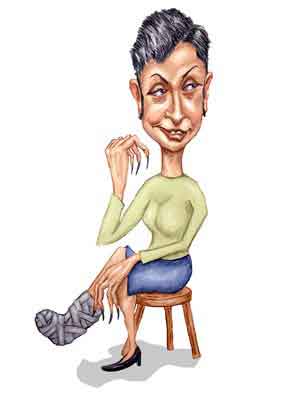Albertine Sarrazin

Albertine Sarrazin
Her book was a novel
No Americans - well, almost none - know Albertine Sarrazin. Certainly they don't know she was (indirectly) responsible for Americans being incredibly misinformed about an (admittedly) small bit of French history. But that's not Albertine's fault.
Albertine Sarrazin was born in 1937, a French citizen in Algiers, and came to France as a baby. Her childhood was troubled (to say the least), and she progressed from foster homes to reform schools and finally to what is politely called a life of petty crime which eventually landed her in prison. Not one to admit error or go along with the system, she broke jail, and in the progress of her escape, her ankle. And as what happens with most prison escapees in the real world, she was recaptured and served out her sentence plus whatever else the judge tacked on for being such a bad girl.
Strangely, Albertine had been a good enough student thoughout her troubled youth, particularly in literary subjects. To while away the time in prison she wrote a novel, L'Astragale. It was published in 1965. It was, we emphasize, a novel which was based on her experiences, and Albertine never claimed it was anything but.
In 1966, a Frenchman living in Venezuela named Henri Charrière walked into a Caracas bookstore and bought a copy of Albertine's book. Henri was himself an ex-convict and had been convicted of Parisian murder in 1931. Although in Albertine's time, prison time a la francais was served in Metropolitan France, when Henry was young, the men were shipped off to the penal colony of French Guiana, known to Americans (incorrectly or at least overly simplistically) as Devil's Island. During the Second World War, Henri had managed to escape and had eventually settled in Venezuela where he had married and become a successful restaurateur. Reading L'Astragale, Henri thought he, too, could write a novel.
Henri bought some notebooks and began writing, basing the story around life in the bagne, a word which sounds to American ears as "bahn" (or a little more correctly as "bahn-yuh" with a very light and almost inaudible "yuh" at the end). When Henri was finished he sent the manuscript to the French publisher Robert Laffont. Robert saw potential for a bestseller, but told Henri they would have to change it so it read as if ...
Well, for that story you'll want to read about Henri himself by clicking here. (Note: Henri's story opens in a new window). Citizens of France know the real scoop, but amazingly and after nearly half a century, it hasn't really filtered trans la mer to Americans yet. In any case, as we said, that Americans remain grossly misinformed about what is really a minor bit of French history really isn't Albertine's fault.
Albertine published two more novels after her release from prison in 1964. Then on July 10, 1967, she underwent a kidney ablation. It was not supposed to be any big deal, but during the operation she had a heart attack and died. She was twenty-nine.
Reference
"Albertine Sarrazin", Columbia Dictionary of Modern European Literature, Jean-Albert Bede and William Edgerton (Editors), 2nd Edition (1980)
"Albertine Sarrazin", http://www.albertine-sarrazin.fr/ In French, but it gives details not found elswhere.